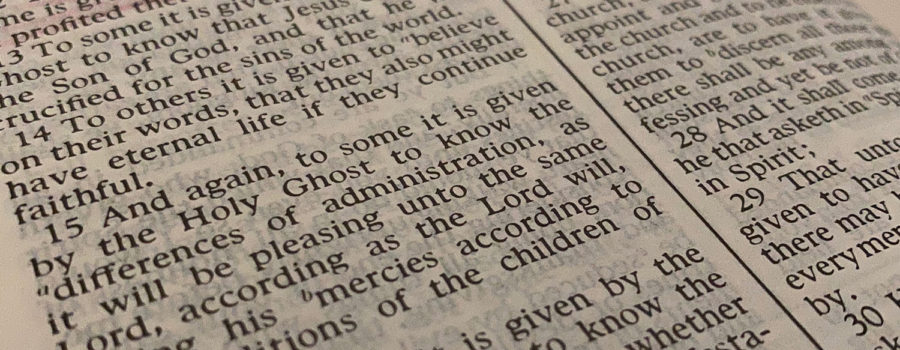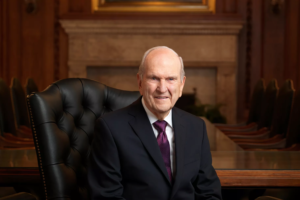To some it is given by the aHoly Ghost to know that Jesus Christ is the Son of God, and that he was crucified for the sins of the world.
To others it is given to abelieve on their words, that they also might have eternal life if they continue faithful. – Doctrine and Covenants 46; 13&14.
These words saved my life. These words gave me peace and calm that I was – am – okay. Why? Because these words resolved an anguish I struggled with for most of my cognizant life.
I am an empiricist. An empiricist is someone that doesn’t claim to know anything, just the probability that something is true by its consistency. This is one of the prominent theories of epistemology, the philosophy of knowledge or the question “what is knowledge.” John Locke is the most well read when it comes to empiricism, but also David Hume and George Berkeley. Essentially, knowledge is only gained from, or mostly from, sensory experience. We know what we experience.
I didn’t know I was an empiricist until I took my first philosophy class and we read Descartes’ Meditations. Descartes is the one who coined “cogito, ergo sum” – I think therefore I exist. I read it voraciously and wrote my response which was an attack against his rationalism. He claims that removing all sensory experience and challenging all beliefs, a process called deconstruction, leads one down to the final point where all that is left is thinking. I bucked that entirely. My argument against Descartes was “how could anyone know they were thinking unless they had something to think about. We cannot think until there is something that prompts thinking, which would be our interacting in the world – experience.” At the time, I hadn’t heard of empiricism, nor had we started it. The professor held me after class, slapped me on the shoulder and said she was impressed that I came to empiricism just how other philosophers have.
It hasn’t always been an easy bed to lie in, but discovering and reading more about empiricism helped me feel comfortable in the world, but it certainly had a challenge in feeling comfortable in the church.
All of my life, all of the people who climb the podium and bright-eyedly exhort their knowledge of god, of Christ, of the Spirit, and the truth of the gospel felt like an accusation of my lessness; an indictment of my not being a good son of God. Even before I was an empiricist, I struggled with claiming that I know anything. I am racked with constant doubt, I constantly challenge my perceptions and beliefs, I regularly go through a deconstruction of what I know and believe to audit for any inconsistency.
How could I ever know that God lives, that Christ is His Son, and the Spirit talks to us? For me, to claim to know something while still holding doubt is inconsistent at least, hypocritical at worst.
I had quit the church at seventeen because of some really bad people that broke my innocent faith. I always believed in God and Christ, but I went on a deconstruction of what I believed. At one point, I decided to believe that Jesus was a space alien, which explained his powers of healing and his ascendancy after resurrection. Not very seriously, but it was just as plausible as any other religious dogma.
Finally, it came down to one thing. I made a decision. And this one decision, after many years and hours spent pondering the existence of God, I chose. I chose to believe in God. Sure, there is plenty of evidence against God, but there is also plenty of evidence to support the existence of God. I chose to believe in God and I pursued learning.
I went to many different sects of religions. I tried many different brands of Christianity. Ultimately, I chose to reinvestigate the church I had been born into, and I developed my evidence of it. But, even still, it was all a reasoned approach. I was still looking for the experiential side of the gospel that I would give me knowledge. So I continued to feel like a failure – I still didn’t have the “know” thing that people are always saying in their testimonies. How could I be a good member and servant of God if I couldn’t get to “know?”
Then I discovered, after Conversion 3.0, this scripture:
To some it is given by the aHoly Ghost to know…To others it is given to abelieve on their words
My life changed. I felt relief. The final building block to firm my foundation of faith had been placed. I am a hard empiricist, which confuses many other empiricists because of the evidence bit, but the sensory experience that has led me this far has proven that my choice to believe in and have faith in God, Christ, and the Gospel is right. Heavenly Father has given his Son to make up the difference and knows us so perfectly, that he knew that there would be many that won’t have that gift of knowing Him and all that is from Him, like me. Although I have the gift of knowledge, it isn’t a knowledge of all that is Him, but the knowledge of how to get to Him through reason, faith, and that final caveat, that for some it is enough to believe on their words.
I try to be very mindful and make it clear, I try very hard to be specific that I don’t know, but I do understand. Understanding is far more powerful for me and others. I might not ever know, but I see His hand in all things, I understand how He sees me and intercedes in our lives, and I understand why the world is the way it is and how it hurts Him. I also understand my role, my place, and my purpose, although I still don’t know why me. But now the why me doesn’t matter, because I understand why me.
What we believe is a choice. We choose to believe or not believe. There is room for our doubt and struggle, but there are also answers to how we can get by them. But, before we have all that opened to us, we have to make a choice that comes before choosing God…
Am I choosing God for Him or what I want Him to do for me?




